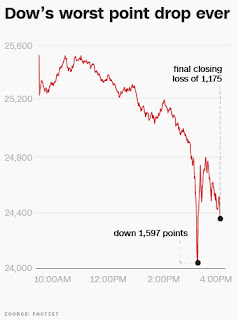 |
| graphic from CNN |
this past Thursday saw another market shake up with the Dow dropping nearly 7% and the S&P having a drop of over 4.8% . fears of a second coronavirus wave and a still historic surge in unemployment from the last few months, coupled with concern over a failure of the U.S. ruling class to collectively address the pandemic and resulting stresses on the economy, all this continues to look very grim. so how should we as ant-capitalists be thinking about this crisis? the following contribution by Dave Ranney is part of that conversation.
By Dave Ranney.
With so many out of work and out of money and the stock market bouncing around, a number of my friends and comrades have asked me to say something about “the economy.” The question to me is: what are the prospects for global capitalism at this moment? The ruling classes around the world are beginning to ask this question and we need to try to anticipate what they are up to and act accordingly. Even before the appearance of the global pandemic and the current economic and social meltdown the system was in trouble. Now it is even more so.
We have seen periods of growth and decline before, but I believe the time span between “expansions” is likely getting shorter over time and that the ruling classes are busy preparing their next move. They will need to find a way for the global economy to grow at even a faster rate since they have been borrowing to keep the last expansion going and to try to get out of the fix they are in now. All of this borrowing is a claim on value not yet created. At some point it has to be paid back by creating new value. Thus the ruling classes have a desperate need to find a way to grow the global system. A likely direction is a return to primitive accumulation through extractivism and exterminism.
Also there are some other factors in the mix now that will determine the limits of what they can do. One is global warming that is responsible for many of the “natural” disasters. And global economic growth is largely responsible for that. The other is pandemics. The present pandemic is likely to be followed by another in short order; not just new waves of what we are experiencing now but another novel virus. The present and the future of pandemics are also related to growth, which has caused massive habitat destruction. That destruction has unleashed ever new and evolving viruses that are facilitated by factory farming, urban densities, and a global public health system in tatters due to political influences mainly by drug companies and competition between capitalist blocs. Future pandemics are also being intensified due to neo liberal globalization and rapid population movements around the world. If a new novel virus follows the present one the present economic collapse is a preview of something worse that could come.
Another factor in the mix that I believe will play heavily on the future is the fragile state of the global financial system that is grounded in the U.S. dollar as the global reserve currency. Other blocs of capital would like to see this end. If it does the cheerful practice of “monetary easing” in the U.S. (printing more dollars without fear of run away inflation) will be at an end. And then what?
There are a lot of possible scenarios rather than forecasts we can imagine. I tried to lay out a few in 2014 in my book New World Disorder which some of you have read. Also Peter Frase’s Four Futures takes the scenario approach.
I hope this didn’t spoil anyone’s last meal, but this is what I have been thinking about. On the pandemic, I highly recommend Mike Davis, Monster at Our Door that was written in 2004 and focused on the Avian Flu at that time. But it pretty much predicted what is happening now as far as pandemics are concerned. And it explains the relationship between disease and the present stage of capitalism quite well. I am trying to write on this myself. I have written an essay on climate change and the Green New Deal proposal that is on my website www.david-ranney.com. The essay on climate change includes a perspective on what a new society might look like.
There is a desperate need to project our vision of a society that does not rely on growth or private property and connect it with all that is happening around us.
Dave’s lived life as factory, labor and community organizer and has been a Professor in the College of Urban Planning and Public Affairs at the University of Illinois Chicago. He is author of the books, New World Disorder: The Decline of U.S. Power, and, Living and Dying on the Factory Floor: From the Outside In and the Inside Out.